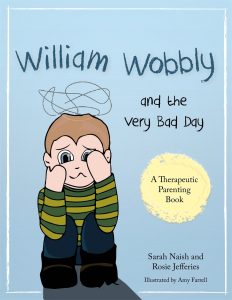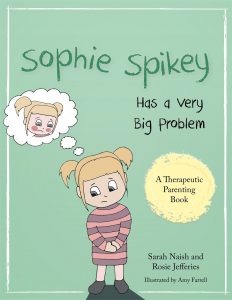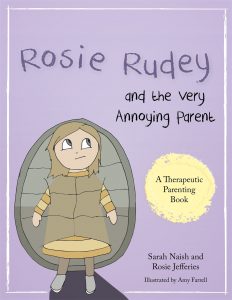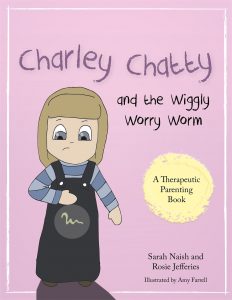Sarah Naish describes the real children behind the characters in her new book series for ages 3 to 10, and explains why each story is such a helpful resource for parents whose adopted or fostered children are struggling to manage their emotions. Introducing Rosie Rudey, Charley Chatty, Sophie Spikey and William Wobbly, none of them had an easy start in life but luckily their mum is here to help them save the day.
 All the time I was raising my 5 adopted children I was desperate to find a book which would cut through all the psycho- babble and help me to help my children – quickly and effectively. My daughter Rosie and I have now written the children’s books that I always tried to find to read to my children. They are Rosie Rudey and the Very Annoying Parent, Charley Chatty and the Wiggly Worry Worm, Sophie Spikey Has a Very Big Problem and William Wobbly and the Very Bad Day.
All the time I was raising my 5 adopted children I was desperate to find a book which would cut through all the psycho- babble and help me to help my children – quickly and effectively. My daughter Rosie and I have now written the children’s books that I always tried to find to read to my children. They are Rosie Rudey and the Very Annoying Parent, Charley Chatty and the Wiggly Worry Worm, Sophie Spikey Has a Very Big Problem and William Wobbly and the Very Bad Day.
Rosie was adopted by me at the age of 8, along with her four younger siblings, aged 7 months, 2, 3 and 6. The children had reactive attachment disorder (disorganised attachment) and were therapeutically re-parented successfully to a secure adulthood. Rosie now works alongside me in Inspire Training Group, helping to train foster carers, adopters and social workers.
Even though I had previously worked as a children’s social worker and nursery nurse, nothing could have prepared me for the challenges I faced as an adopter of five traumatised children. It was extremely tough to try to get all the children to where they needed to be. I also learnt all about how the children needed a different kind of parenting; Therapeutic Parenting. Empathy in abundance, throwing away star charts and learning to never ask ‘why’!
The most important task, as a therapeutic parent, was to break the ‘cycle of abuse’ and to help my children to form reciprocal relationships with secure attachments. The prognosis for my children was very poor when they came to live with me and we all lived through some shockingly tough times.
As a therapeutic parent I learnt the importance of routines and boundaries, never being vague and having to be 100% reliable. I also needed to consistently ‘think outside the box’ and learn about the effects that the children’s early missed nurture had on their development and relationship with the world.
Rosie, had learned not to trust adults. For many years she rejected me as a parent and was mainly hostile, defiant and scared. Rosie Rudey is an accurate portrayal of Rosie in her younger days!
My son William was very fearful and anxious, displaying symptoms similar to ADHD and sensory processing disorder. He struggled at school, with friendships and also with interacting appropriately on a social level. He is represented by William Wobbly.
Two of my daughters displayed similar behaviours. They talked incessantly, smiled all the time, (even when sad), exaggerated and told lots of stories. Later in my training I started referring to this as ‘mad lying’ as it is on a different scale to the fibs securely attached children normally tell! I have combined these two children into the character, Charley Chatty.
My daughter Sophie, represented in the books by Sophie Spikey, was also overly independent and unwilling to ask for help. I always referred to her as the ‘hand grenade thrower’ as her survival strategy was to work hard to make trouble and divert attention from herself.
 With five children with varying needs, I found it very difficult to access child friendly, therapeutic resources which helped them to understand their own behaviours. Some fairly simple books came with a plethora of instructions for the parents to read first. I devised a number of stories and practical activities to help the children work through their early life trauma. I also kept a diary which helped me to recall the stories in later life, once the children reached adulthood and I had time to breathe and think!
With five children with varying needs, I found it very difficult to access child friendly, therapeutic resources which helped them to understand their own behaviours. Some fairly simple books came with a plethora of instructions for the parents to read first. I devised a number of stories and practical activities to help the children work through their early life trauma. I also kept a diary which helped me to recall the stories in later life, once the children reached adulthood and I had time to breathe and think!
Rosie told me that she found the most useful approach I had used was ‘naming the need’. This was when I would think hard about the behaviour I was seeing and help the child to relate it back to where it might have come from. This helped the children to understand and manage their own behaviours. I certainly noticed myself, that this strategy, used with lots of empathy, had a big positive effect on the children’s behaviours and emotional development.
When we delivered training in therapeutic parenting and attachment, foster carers and adopters often told us that they did not know how to start conversations with their children, or to ‘make a guess’ at where the behaviours came from. We used anecdotes from our lives to illustrate this, and carers enthusiastically suggested we put the examples into a book.
As I recalled the stories from my diary, and rewrote them from a child-centered perspective, Rosie read them alongside me and made suggestions about the child’s thoughts and feelings to ensure they were authentic. Through the stories we explained the behaviours to the child AND parent simultaneously. We then ensured we gave the parent the correct ‘therapeutic words’ to connect to their child.
Our main motivation is to inspire as many parents as we can to use therapeutic parenting strategies confidently, thereby giving themselves the best chance of achieving excellent outcomes for their children.
Sarah Naish is Director of Inspire Training Group (www.inspiretraininggroup.com) which delivers training to fostering agencies and local authorities on attachment and trauma-related issues. Sarah qualified as a social worker in 1991 and went on to found her own therapeutic fostering agency. She is parent to five adopted children. Her daughter, Rosie Jefferies is also a trainer at Inspire Training Group. Sarah and Rosie both live in Gloucestershire, UK. Click here to find out more about the series.
Great books for children who have had disadvantaged starts in life. Lets them identify with what’s happening to the characters and explain how they feel, and what they can do. Excellent!
Fantastic books I use them with the children I foster and they are very helpful. Easy to read and give some great talking points.
Five stars. These are excellent books my daughter responds so well to them, highly recommended
Brilliant books. the children love reading them and it enables us to answer and ask questions with them.
Great books the child spoke after and said that book is about me thanks mum for understanding me x